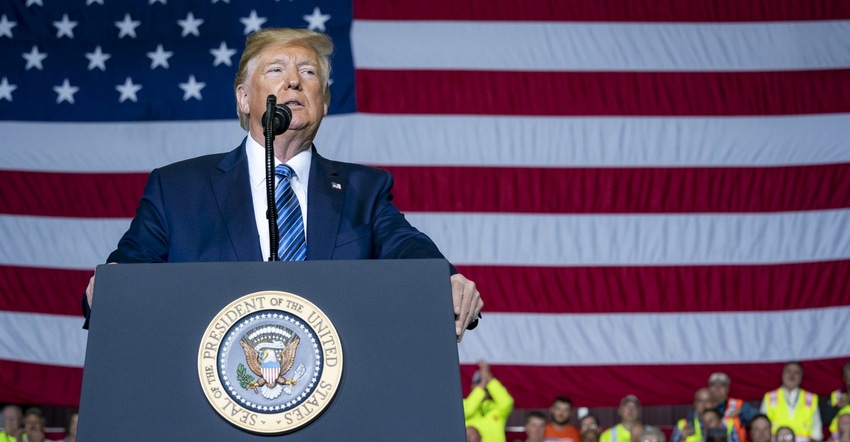Trump creates his own ‘fake news’
Comments unfold on Japan's purchases of U.S. wheat and increased trade war ramifications.

President Donald Trump continually comments on how much he loves farmers and how he has their best interests in mind. This week, while delivering remarks on energy in Pennsylvania, Trump went off script and seemingly showed a lack of understanding of agriculture’s role in global trading markets.
Trump diverted from his planned topic of energy and interjected with talk about trade with Japan, where he directly discounted the importance of wheat exports to the market. “Many car plants -- they’re coming in from Japan. I told Prime Minister [Shinzo] Abe ... ‘Listen, we have a massive deficit with Japan.’ They send thousands and thousands -- millions -- of cars. We send them wheat. Wheat (laughter). That’s not a good deal, and they don’t even want our wheat. They do it because they want us to at least feel that we’re okay. You know, they do it to make us feel good,” the official White House transcript said of the speech.
The National Association of Wheat Growers (NAWG) was quick to respond, pointing out that Japan is the number-one market for U.S. wheat exports, on average, not because they want U.S. farmers to feel okay; “they buy it because it’s the highest-quality wheat in the world,” NAWG noted in a tweet response.
.@realDonaldTrump Mr. President, Japan is the #1 market for US wheat exports on average, where we hold just over 50% of the market. They don’t buy our wheat because “they want us to feel okay.” They buy it because it’s the highest quality wheat in the world. That’s not fake news.
— NAWG (@wheatworld) August 14, 2019
The comments come at a time when the U.S. wheat industry is one of many sectors that could see a downward spiral in farm-gate prices due to the Trump Administration's trade actions.
In his first days in office, Trump withdrew from the Trans-Pacific Partnership (TPP). When the remaining 11 TPP member countries signed an updated agreement without the U.S. on March 8, 2018, it created a looming disaster for U.S. wheat farmers and related industries.
The deal would gradually discount the effective tariff millers pay for imported Australian and Canadian milling wheat from more than $150 to about $85 per metric ton. This process began on Dec. 31, 2018, followed by a second round of cuts on April 1, 2019. This discount for competitor wheat will continue to grow until 2026, when U.S. wheat exports will be at a $65-70/mt disadvantage.
No China relief for ag
Earlier this week, Trump also decided how to impose 10% tariffs on goods Americans buy from China. Although it was a recognition by the Administration that Americans -- not China -- are starting to bear the burden of the tariffs, it still falls short of offering the solution farmers keep asking for: trade, not aid.
It’s time to reopen the market with China for U.S. agricultural products.
The Tariffs Hurt the Heartland coalition in a statement said while the delay in some of the tariffs is appreciated, it clearly shows that that the Administration recognizes that tariffs are taxes paid by Americans.
"Unfortunately, today’s announcement doesn’t address the vast majority of tariffs that are driving uncertainty, putting farmers out of business and causing small businesses to slow hiring,” the coalition said in a statement.
On Wednesday, the stock market took a nearly 800-point drop amid increasing concerns that the China trade war will drag on.
According to the U.S. Department of Agriculture, $6.3 billion in agricultural export losses to China are expected this year alone.
Reports also revealed that Agriculture Secretary Sonny Perdue made a joke about farmers “whining” about Trump’s trade war.
Heidi Heitkamp, founding board member of the One Country Project and former U.S. senator for North Dakota, said Perdue’s comments are not only “ill timed and insensitive, [but] they also reflect President Trump’s attitude towards our nation’s farmers.”
Heitkamp noted that American farmers are filing for bankruptcy at alarming numbers, while U.S. farm debt is expected to reach about $427 billion this year -- the highest level since the 1980s.
“President Trump’s solution? Dismissive attitudes throughout his entire Administration. Mr. President and Mr. Perdue, it’s time for real leadership, not name calling,” Heitkamp added.
Trump commonly tweets about farmers, and it was no different on Thursday when he said farmers know how important it is to win on trade.
Our Great Farmers know how important it is to win on Trade. They will be the big winners!
— Donald J. Trump (@realDonaldTrump) August 15, 2019
The time for action on trade is now. Farmers may not be able to stay afloat much longer.
About the Author(s)
You May Also Like




.png?width=300&auto=webp&quality=80&disable=upscale)
